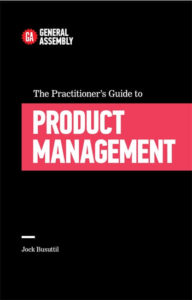
PRODUCTHEAD: Product management post-COVID-19
PRODUCTHEAD is a regular newsletter of product management goodness,
curated by Jock Busuttil.
street product (fade out)
tl;dr
Mind The Product pivoted in 8 weeks, then spent the next 8 months refining the concept
When working remotely, post information in at least 3 places to ensure everyone sees it
Pivots that align with the existing corporate vision tend to be more successful
The shift to digital during the COVID-19 pandemic will not be as sticky as some assume
a favour: please share this with other product people
every PRODUCTHEAD edition is online for you to refer back to
hello
Has COVID-19 fundamentally changed product management? To answer in the time-honoured way for product managers, “it depends”.
Why so? It depends largely on how you were managing your products to begin with. For some organisations, the novel coronavirus has reinforced their existing ways of working; for others, it’s completely disrupted them.
The conflation of home and work life has meant that people often have no choice but to bring their whole self to work. Accordingly, it’s been a real test of how humane employers are in practice. Not everyone has the luxury of a dedicated home office, decent broadband and, if they have kids, reliable childcare.
Have employers recognised their greater duty of care by supporting, trusting and being flexible for their staff? Or have they put in place trackers to measure productivity, and expect responses to emails at 5pm on a Saturday?
All of these responsibilities were there before, but COVID-19 has amplified them.
Then there has been the approach to corporate and product strategy: to change or not to change?
Some businesses operated in denial and resolutely stuck to their existing plan; some panicked and threw everything out of the window, good and bad alike. Others took a more considered view of how dependent their existing business model was on close-proximity contact and adapted or pivoted in response. Some even identified and exploited opportunities presented by the pandemic (Zoom, Disney+).
Even in the most vulnerable markets where you’d expect the most corporate casualties, you can point to retailers that have embraced online ordering and curbside pickups, restaurants that have diversified to now sell groceries, event organisers that have pivoted to premium subscription content, and passenger airlines repurposing their fleet for freight.
Everyone — early adopters and laggards alike — has been forced to experience more products and services digitally. People’s experiences using these products have not been uniformly positive, and this will colour their willingness to use digital services post-COVID-19.
And even though the pandemic has undeniably raised the digital bar, not all of these new behaviours are going to stick. Some online services will be discarded as soon as a viable physical alternative is permitted again: many of us are going to head back to our respective offices whether by choice or managerial mandate; and people are desperate to take a foreign vacation when permitted to do so.
So what does this all mean for product management?
It all comes back to some fundamental principles:
1. We must respond to and anticipate our users’ ever-changing needs.
2. We need to remember that our products and services are simply what people use to achieve a goal more important to them.
3. We must be stubborn on our vision to change the world for the better and flexible on the strategic steps to get there.
4. We should know when to act, when to think about acting, and when we’re in denial despite all available evidence.
5. We need a plan B (and C and D) in case of unexpected market plot twists, especially if our business model is reliant on a single big customer / supplier / route to market.
This week I’ve pulled together for you some more opinions on post-COVID product management.
Speak to you soon,
Jock
what to think about this week
Mind the Product: Surviving 2020
We know that people enjoy product case studies and like learning about what other teams have been through, but it can be hard to find people willing to share. This is because real life often looks very different from the polished think pieces and frameworks that you see in most articles. But the truth is, even when you know how things should operate in an ideal world, you often have to work through less-than-ideal situations. So in the spirit of sharing the marvellous messiness of product work, we thought we’d write a case study of our own experiences here at Mind the Product.
Reprioritise, move fast, add polish later
[IMOGEN JOHNSON & EMILY TATE / MIND THE PRODUCT]
How to Win at Remote Product Management
I’ve been working with distributed teams for nearly 15 years, but my most challenging setup (yes, even when considering the pandemic) was in 2012. At the time I was in NYC working for a local tabloid. The people I worked most closely with were based in Seattle, France, Sweden, and India. Each group had its own time zone, ways of working, tech stack nuances, collaboration tools and styles, and comfort with English. In spite of these challenges, we were able to build 4 great mobile products and create lasting professional relationships — remotely.
Over-communicate, over-communicate, over-comm…
[MERISSA SILK / MEDIUM]
Product Management Coaching
Whether you’re new to product management or have been a product manager for years, a coaching session can help you to step up your career.
We’ve coached people wanting to get into product management, product people with nobody in their organisation to manage them, and experienced product managers preparing to apply for a promotion.
We can help you prepare for your product manager interview, including mock interviews.
A proportion of the fees from every coaching session is donated to charity. Just reply to this email if you’re interested in finding out more.
How Businesses Have Successfully Pivoted During the Pandemic
From local restaurants to larger companies like Spotify and Unilever, companies that are successfully navigating the COVID-19 pandemic and ensuing recession have often pivoted to a business model that’s conducive to short-term survival, and long-term resilience and growth. Not all pivots, however, result in good business performance.
Don’t undermine, reinforce your strategy
[MAURO F. GUILLÉN / HARVARD BUSINESS REVIEW]
What’s next for digital consumers
Consumers say they will spend less time in digital channels once the pandemic ends. Here’s what it means for companies.
[MCKINSEY]
recent posts
Mission to Mars
Imagine you’ve just been told that you’ll be a member of the team responsible for the first manned mission to Mars.
Now imagine someone asks you how much the mission’s going to cost. The whole thing. There and back. By close of business on Thursday.
[I MANAGE PRODUCTS]
The neverending quest for product-market fit
Often the biggest barrier to your product’s widespread adoption is going to be whether it reaches product-market fit early on. Even if you do, you’re wrong if you think you never need to worry about product-market fit again.
[I MANAGE PRODUCTS]
How do you find the balance between autonomy and focus for PMs you’re managing?
As context, I have a PM in my team who I regularly find digging into areas of the business that are unrelated to the initiatives they’re responsible for. They also have a track record of being extremely slow to bring anything to market (often because they’re chasing those squirrels).
As much as I try to encourage a curious mindset in of all my team, our business has so much ground to cover we can’t really afford a lot of leisurely exploration.
Why are you chasing squirrels?
[I MANAGE PRODUCTS]
can we help you?
Product People is a product management services company. We can help you through consultancy, training and coaching. Just contact us if you need our help!
Helping people build better products, more successfully, since 2012.
PRODUCTHEAD is a newsletter for product people of all varieties, and is lovingly crafted from a 2008-era vegetable spiralizer.


Leave a Reply